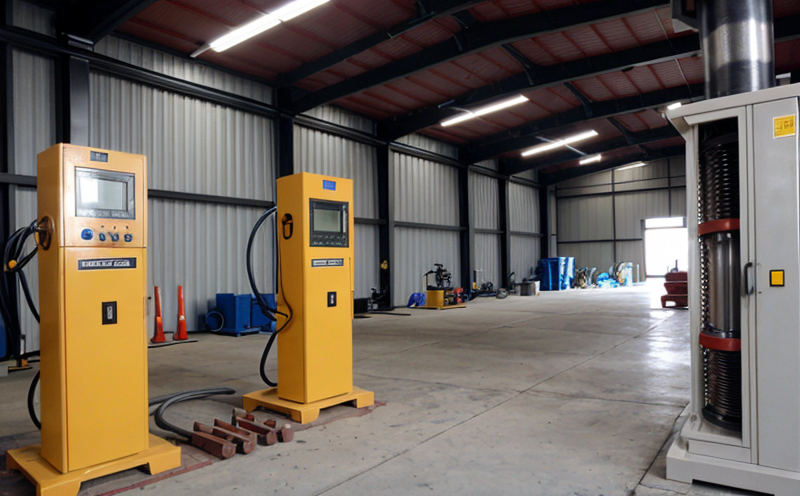ASTM D7030-16 Edgewise Crush Resistance
The ASTM D7030-16 Edgewise Crush Resistance test is a critical evaluation of the mechanical strength and compression resistance properties of flexible packaging materials, particularly films, laminates, and pouches. This method ensures that these materials can withstand the stresses encountered during handling, storage, and distribution without compromising their integrity.
The test involves clamping one end of the specimen between two jaws and applying a constant load at an angle to the plane of the film until failure occurs. The primary objective is to determine how much force or stress the material can endure before it crushes or collapses under the specified conditions. This information is vital for ensuring that packaging materials meet industry standards, protect products during transportation, and provide consumers with reliable and safe containers.
The test setup typically includes a compression testing machine equipped with a specific type of fixture designed to apply force in an edgewise manner. The specimen's orientation within the fixture plays a crucial role in accurately replicating real-world stress conditions experienced by packaging materials during handling. By understanding these parameters, manufacturers and suppliers can optimize their product designs for better performance.
For accurate testing results, it is essential to follow strict specimen preparation guidelines provided in the ASTM D7030 standard. This includes cutting specimens of specific dimensions, ensuring they are free from defects or imperfections that could affect test outcomes. Compliance with these procedures ensures consistent and reliable data across multiple tests.
The edgewise crush resistance test is used to evaluate various packaging materials such as polyethylene (PE), polyester (PET), nylon (NYLON), and multi-layer films. Understanding the specific properties of each material type helps in selecting appropriate materials for different applications, ensuring that they meet the required performance criteria.
Test results are reported based on the maximum load at failure or the strain at which failure occurs. These metrics provide valuable insights into the mechanical strength and durability of the packaging materials being tested. Reporting these values allows for comparisons between different samples or versions of a product, helping manufacturers identify areas where improvements can be made.
Why It Matters
The importance of ASTM D7030-16 Edgewise Crush Resistance testing cannot be overstated. In the packaging industry, ensuring that materials have adequate mechanical strength and compression resistance is crucial for several reasons:
- To prevent leaks or breaches in the package during transport.
- To maintain product freshness by protecting contents from external factors like humidity and temperature fluctuations.
- To enhance consumer confidence through reliable and safe packaging solutions.
- To comply with regulatory requirements set forth by various standards bodies, including ASTM and ISO.
By conducting this test, manufacturers can ensure that their products meet not only internal quality standards but also external ones imposed by regulatory authorities. This enhances brand reputation while reducing the risk of product recalls or damage during transit.
Environmental and Sustainability Contributions
- The ASTM D7030-16 Edgewise Crush Resistance test promotes sustainable packaging practices by identifying materials that are robust enough to protect products without being excessively heavy, thus reducing waste and resource consumption.
- By selecting suitable materials based on their crush resistance properties, manufacturers can minimize environmental impact throughout the product lifecycle from production through disposal.
- This testing contributes to responsible use of resources by encouraging innovation in material science that leads to more durable yet lightweight packaging solutions.
The results of this test are instrumental in driving forward eco-friendly initiatives within the packaging sector, ultimately contributing to global efforts towards sustainability and reducing carbon footprints associated with manufacturing processes.
Use Cases and Application Examples
| Use Case | Description |
|---|---|
| Flexible Packaging Materials Evaluation | Evaluating the crush resistance of flexible packaging materials like films, laminates, and pouches. |
| New Material Development | Testing new material formulations to ensure they meet required mechanical strength standards before commercialization. |
| Quality Assurance | Performing regular tests on existing products to maintain consistent quality levels over time. |
| Supply Chain Optimization | Identifying areas where material improvements can lead to cost savings and operational efficiencies within supply chains. |
| Regulatory Compliance | Evaluating materials against regulatory standards to ensure compliance with international guidelines like ISO, ASTM, EN, and IEC. |
The above examples demonstrate how the ASTM D7030-16 Edgewise Crush Resistance test plays a pivotal role in various aspects of flexible packaging development and quality assurance. It serves as a cornerstone for ensuring that products not only meet but exceed industry expectations.





